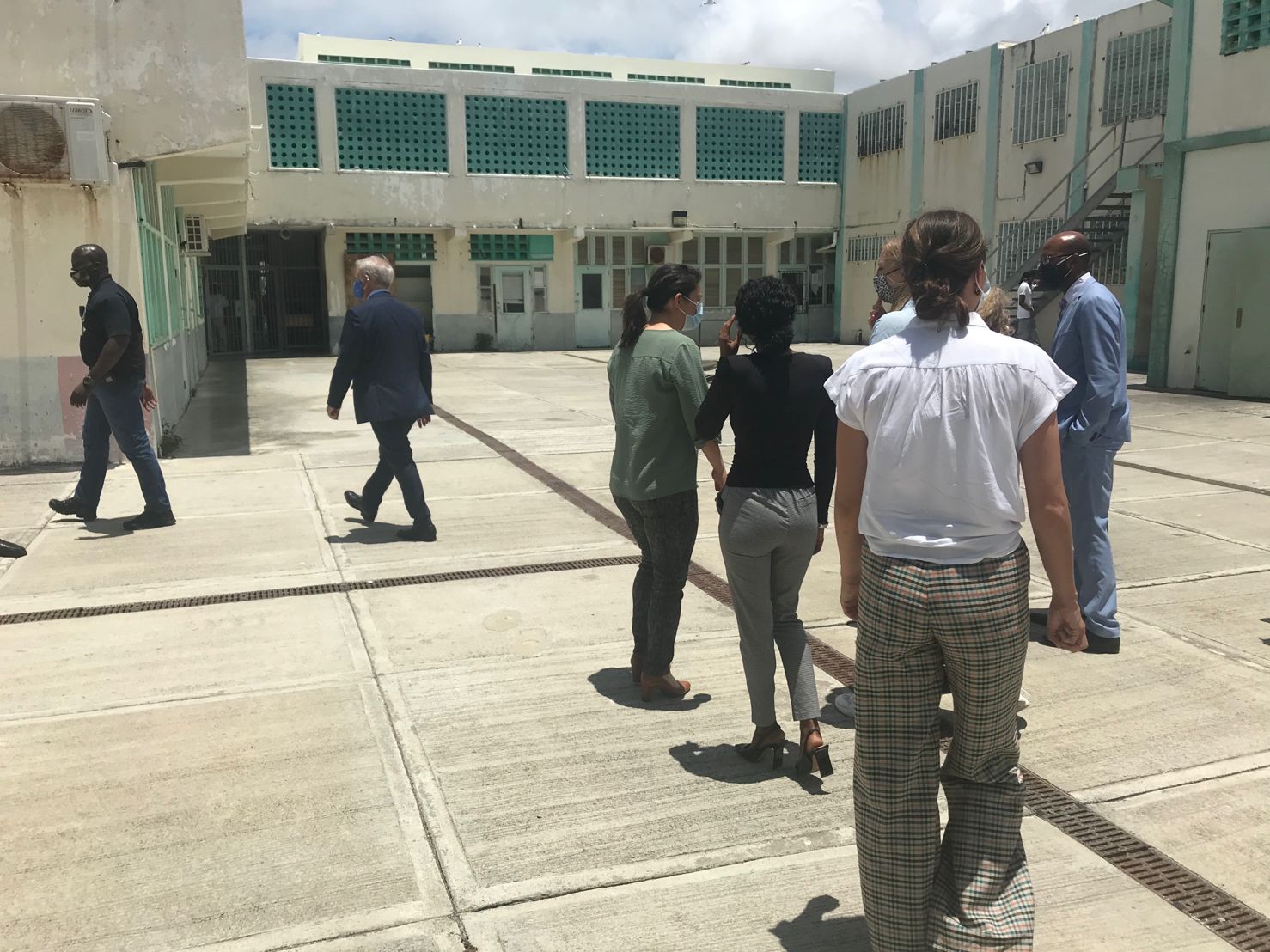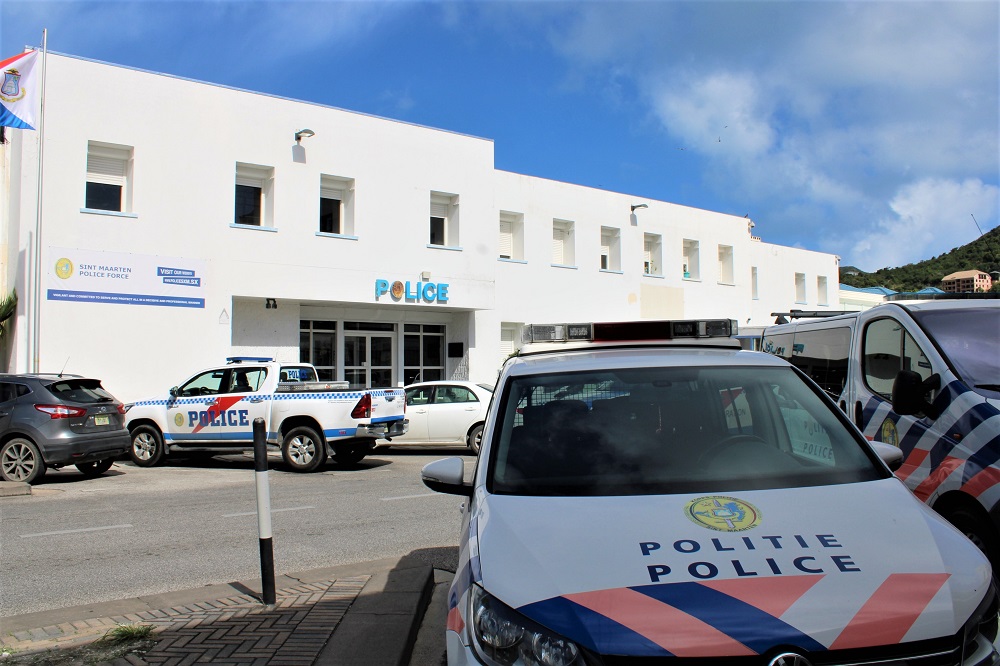
PHILIPSBURG — The Progress Committee published its fiftieth progress report since St. Maarten became an autonomous country on October 10, 2010, in September. The committee monitors the progress with plans of approach for the police force and the Pointe Blanche prison. Sad conclusion: there is no progress.
Chairperson Jurenne Hooi nevertheless states in the introduction of the report that she presents the results of its latest report “with pleasure,” even though the committee did not manage to speak with the governor, the prime minister and the office for rehabilitation during its visit to the island in March. The general impression, the report states, is that not much has improved since the previous report.
 However, the arrival of Nathalie Tackling as the country’s new Minister of Justice, makes the committee optimistic: “The confidence and the expectations are high.”
However, the arrival of Nathalie Tackling as the country’s new Minister of Justice, makes the committee optimistic: “The confidence and the expectations are high.”
The Pointe Blanche prison remains a reason for concern; the lack of progress is due to instability in the prisons management team, or, as the management team expressed it: “Nothing has happened.” This is in part due to the fact that the focus is on the construction of a new prison. The indications the Progress Committee received are nevertheless alarming: “The Public Prosecutor’s office, the supervisory board and the Law Enforcement Council all say that St. Maarten Is becoming less safe and that the situation at the prison is bad.”
The report states that the prison is overcrowded (in other words, there are more inmates than the cell capacity allows) and that this makes it impossible to keep suspects of serious crimes in pre-trial detention. The prison uses its ‘punishment cell’ as a regular cell.
The prison is also confronted with crucial vacancies; for instance, the vacancy for a project leader is still open after the only candidate withdrew. The project leader, once on office, will be the liaison with UNOPS (United Nations Office of Project Services) and UNODC the United Nations Office on Drugs and Crime).
Another concern is that the tender for the construction of a new prison was unsuccessful. UNOPS has issued a new tender that will close at the end of May.

The police force is struggling with a lack of personnel. New officers are being hired but they are outnumbered by those who leave the force. Customs, the National Detectives, the police, the prison and immigration services all struggle with staff shortages. St. Maarten will have to look abroad for solutions.
The committee notes that a structural budget for training is still lacking and that there is no progress with the housing of the central dispatch, the shooting range and class rooms.
Another issue is the lack of an independent mandate for the Chief of Police: he only wants that mandate if he gets the budget to go with it. “That goes without saying,” the Committee states in its report.
The Committee mentions that the new Minister of Justice (Nathalie Tackling) is “a pleasant change of the guard.” Tackling’s ministry is also struggling with understaffing and she is preparing a request to the Dutch Ministry of Home Affairs for hands-on assistance, rather than financial support.
###
Opinion: Fifty Reports
By Hilbert Haar
The establishment of a progress committee after St. Maarten obtained autonomous status within the Kingdom on October 10, 2010, seemed like a good idea. The committee is charged with monitoring the progress our country makes with plans of approach for the Pointe Blanche prison and the Police Force, KPSM.
The keyword in their mandate is the term monitoring. The committee is in that sense a bit of a toothless tiger. It can growl but it cannot bite. This does not mean that the efforts the committee has made over the past fifteen years have been meaningless. On the contrary, it has painfully documented the shortcomings in St. Maarten’s efforts to solve obvious problems.
That some of these problems still exist after sch a long time is partly due to negligence and possibly in part also to political unwillingness. I seem to remember that one of our former ministers of Justice, Cornelius de Weever, once famously said about the neglected Pointe Blanche prison: “If the problem gets serious enough it will automatically become a Kingdom problem.” It sounded very much like a lame excuse for doing nothing at all.
In the meantime, the Progress Committee has published fifty reports – and the latest issue is once more not a reason to celebrate anything.
“Nothing has happened,” the prison’s management team told members of the Progress Committee when they visited our island in March.
When you read the twice-yearly reports, you have to give credit to the authors for their linguistic artistry. The tone of the reports is always mild, even though the findings are never very short of being disastrous. By now, the committee-members must realize that their reports have as much effect on local politicians as reports from the local audit chamber: they get ignored. No big deal.
And the reason why this is so cannot be that all committee-members are Dutch; after all, former lieutenant-governor Franklyn Richards is a respected part of that team.
When you read the latest report, you learn that the prison is overcrowded, that the police force cannot hire new officers fast enough to make up for officers that leave the force and that St. Maarten is, little by little, becoming less safe.
What do we need to change direction? What does it require to make sure that the police force and the prison get adequate resources to execute their duties?
I would almost say: political courage, but that would create a misunderstanding. A better term is political willingness. You don’t need courage for that. What you need is politicians who recognize the problem and who understand that they have the solution in their hands. It requires making hard choices when the government presents its next annual budget and it requires that parliamentarians demand that such a budget contains the provisions that give both the prison and the police force the tools to do their jobs properly.
Is that too much to ask? Looking back over the past fifteen years it is tempting to say that, indeed, it is too much to ask. But looking forward, there seems to be light at the end of the tunnel, since the Progress Committee has described the arrival of the new Minister of Justice, Nathalie Tackling, as “a pleasant change of the guard.”
Only time will tell whether that observation has any practical value.
###
ADVERTISEMENT












